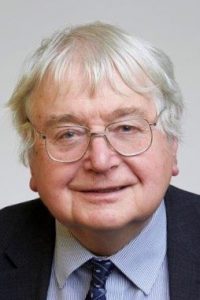Towards a data-enabled Europe

“My vision of a data-enabled Europe is that it improves the quality of life of its citizens”
Professor Richard Catlow, Royal Society Foreign Secretary and Vice-President, talked with ALLEA about the motivation behind the ALLEA-Royal Society conference “Flourishing in a data enabled Europe” held on 1-2 November 2018 at Chicheley Hall, United Kingdom. As Chair of the Organising Committee of this initiative, Prof Catlow shared with us his vision on what academies and scientists can do to promote new uses of data for human benefit.
Tell us about the incentives of setting up this initiative.
In September 2017, I summarised the work of the Royal Society and British Academy on Data management use: Governance in the 21st Century at the General Assembly of ALLEA in Budapest. There was high interest in this topic, with many members from academies around Europe recognizing it was timely to consider the impact of data and digital technologies on society. So together with then ALLEA President Gunter Stock we decided to launch a joint Royal Society and ALLEA project to explore a vision for the use of data for human benefit in Europe. This is what led to the pan-European conference on Flourishing in a data-enabled society held on 1-2 November 2018 at Chicheley Hall, UK. The Royal Society is pleased to be hosting a conference that brings together leading thinkers on this topic from across Europe, which is one of our key roles in continuing to input into fora to shape the European scientific endeavour.
One of the main features of this conference is that it seeks to involve different sectors: from science to big tech all the way through to governments and public sector. What is expected from this cross-sectoral dialogue?
Currently, there are many debates on the use of data – but they are often unconnected, focusing on particular sectors or disciplines. Although governance solutions are often, and rightly, context specific, there is a need to connect debates across sectors to ensure that learning spreads across different sectors as quickly and effectively as possible. The conference also served to explore the diversity of approaches that can be found across Europe, and to draw where possible features that transcend borders which might inspire strategic decisions from various actors, from industry to governments.
How can academies best help shape the debate around the controversial topic of data use?
If we consider the memberships of ALLEA’s network of academies across Europe, there is a tremendous breadth of knowledge and expertise, across all sciences and humanities, that can help shed light on questions about the use of data and digital technologies. Academies can convene leading experts and have a critical role in gathering evidence and informing public debates. All stakeholders need to be engaged. For example, as part of the Royal Society’s work on machine learning, we commissioned a public dialogue which gave us a better understanding of what the UK public thinks about these technologies.
What is your vision of a data-enabled Europe?
Overall my vision of a data enabled Europe is that it improves the quality of life of its citizens, including a thriving research community across academia and industry. Technology should serve all of society and not just certain groups, and be trusted as it supports people and communities in their life, their work and their learning, while maintaining human autonomy. Ethical and responsible technology should meet as best as possible the needs of individuals and society. And we need governance and strategies that ensure a fair distribution of benefits and risks.
Learn more about the conference “Flourishing in a data-enabled society”.



